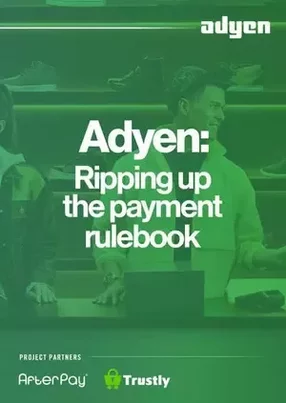Adyen have revolutionised outdated payment systems and become a significant player in the market
The payment service provider (PSP) market is booming. Mass globalisation has led consumers to demand access to products and services with the ability to pay across a number of different channels at the click of a button.
Tackling the challenges that businesses experience within this space is Adyen. Partnering with a number of popular streaming services, such as Facebook, Spotify, Netflix, and more, its integrated platform enables payments to be undertaken through any channel and processed on a single platform. Such has been the relentlessness of the company’s growth, its processed volume growth has risen from €12bn ($14bn) on an annual basis to a staggering €108bn ($125bn) in 2017. Shares have also surged up to 90% upon the launch of its IPO in Europe.
Four years previously, Senior Vice President of Business Development, Northern Europe, Jussi Lindberg, wanted to gain a greater understanding of how Adyen was setting itself apart from other payment providers.
“When working at PayPal, Adyen was a partner that had the fastest growth ever when it came to the PSP space. I had to know what the secret sauce was. Why were they giving so much volume to us at PayPal? After working a bit more closely with Adyen I found the company was really something extraordinary,” he explains.
“Adyen was building something more quickly than anybody else, but at the same time helping businesses globally scale in a different manner than anyone had been doing previously.”
Shortly after, Lindberg joined the company in 2014.
Outstanding collaboration
Working with businesses as a payments partner, Adyen seeks to collaborate with them to plan how they can successfully scale.
“Businesses want to take the next future step to sell anywhere, at any time, via any channel to anyone globally. So, the world is shrinking,” says Lindberg.
“We’re also seeing consolidation in the types of vendors. Beforehand, the payment space was very fragmented, where you had one gateway or payment method per country that you had to contract. If merchants were selling in 40 different countries, that equates to 120 different vendor relations, technical connections, and also reporting lines.
“This is just not feasible as nobody has the bandwidth to take this on, especially in the payment space,” he adds. “Companies want to be focusing on increasing net promoter scores; ensuring conversions go up and be more in tune to what they are actually doing, which is taking care of customers instead of vendor relations. This is where we're seeing tremendous growth.
“Thirdly, we are seeing something contradictory, which is more fragmentation,” he continues.
“Whilst the world is getting smaller at one end, local initiatives offering new ways to pay are continuing to pop up. Today, I'm based in Sweden and, for instance, have four or five payment methods that we have to integrate at Adyen instead of our customers having to do this.
“New regulations are also coming up so the world is still fragmented, making it important for us to be a partner where we have control and give the best advice to our customers and partners.”
Complex regulations
Building a new, state-of-the-art infrastructure, any type of transaction placed through Adyen’s platform is highly secure, but unusually, is not sent to a third party. Instead, the business sends this directly to the required payment method and receives an immediate response back. Through this, Adyen has gained improved authorisation rates against its competitors.
“We can also process payments in store on the same, single platform. From a technical standpoint, our solution is quite complex but we're making it easy on the customer and partner side,” explains Lindberg.
Additionally, with General Data Protection Regulations (GDPR) coming into force across Europe, Lindberg explains that whilst the company is fully up and running and is set to adhere to the vast changes to traditional regulatory requirements, the business will remain challenged.
“We are GDPR ready and will take full responsibility on what is put on us as a company at our end. Then, of course, it is up to any company that we are also partnering with to do their part as well,” he says.
“We are also Payment Service Directive 2 (PSD2) ready. If we are talking about payments and what is happening in the payment space, there are a lot of acquisitions, which also house multiple platforms to send payment data through.
“Whilst it’s trickier for competition to be PSD2 and GDPR ready, we only have to do it once per region because we have a single platform. For them, they have to do it over and over again, which slows our competition down.”
Entering new markets
Providing popular music juggernaut Spotify with a payment processing platform for its premiums business, Adyen has fully supported the firm to scale and enter new markets. With a number of different payment details, varying music catalogues and rights dependent on each country in which it serves, Adyen has strived to ensure that premium users can only tap into the catalogues relating to the country where the card (and user) resides.
The business also caters to companies which have complex regulations to deal with. China, for instance, is a particular focus and houses a unique payments market. With this in mind, Adyen offers several Chinese payment methods, such as WeChat Pay and Alipay outside of the country, in order to cater to this specific target audience.
“No business without a local Chinese-based corporation is allowed to sell or offer Chinese payment methods. Adyen and other payment vendors cannot sell or target Chinese companies. On the other hand, we can help Chinese companies that want to sell outside of China, such as in the US, with this payment method,” says Lindberg.
Supporting companies to scale
Whilst more and more companies are wanting to be on top of their payment data, Adyen’s platform will provide a better payment experience. Its technology has also worked to support retailers such as Daniel Wellington as well as ride-hailing company Uber.
Most importantly, delivering simplification for its customers, particularly within the physical point of sale (POS) space means that Adyen has a unique Unified Commerce offering. By having e-commerce and in-store payments processed through one platform, companies are able to create better, more personalised customer journeys such as click-and-collect, where customers can order something online and pick it up in store, or endless aisles, where in-store tablets let shoppers order items that are out of stock online while in store. A Unified Commerce approach allows retailers to reshape the purchase experience, making it frictionless.
Adyen also aims to simplify and improve the payments experience on the merchant side. Adyen MarketPay, a solution for large marketplaces, simplifies the flow of payments, providing split payouts, easier reporting, driving a complete frictionless experience for both vendors and end-customers.
“There is complexity with not only accepting a payment, but sometimes splitting a payment between multiple sellers. With more than one vendor, transactions need to be split evenly, and sometimes sellers also have different commission plans,” explains Lindberg.
“Before, transactions had to be initiated not only once, but twice to make sure that this transactional split was happening. Today, we can completely automate this with our MarketPay API solution.”
Such solutions are therefore in significant demand for big consumer-driven companies such as Etsy or eBay, where payment systems are becoming increasingly complex. Whilst there might be multiple sellers in one transaction trying to sell an item purchased by a consumer, upon completion, merchants then submit the relevant consumer details.
See also:
- How Mercedes-Benz Group Services Philippines is delivering state-of-the-art financial services
- How Schneider has delivered unrivalled transportation and logistics services for more than 80 years
- Interview: Freshfields and the new age of technology in legal services
“This is unique to Adyen and that's what's really driving the market solution and appealing to merchants,” Lindberg says. “There’s no exclusivity, so we can replicate these solutions to other vendors.”
Furthermore, to bolster its efforts to reduce potential risks, Adyen uses data and machine learning in its payment routing, optimising authorisation rates.
“It's not only a machine learning tool, it's also how we interpret the different types of risks that we are associating with different types of transactions,” adds Lindberg.
“With just one state-of-the-art platform, we can check transactions once, and then once it gets back from the payment team we also check it again. This supports enterprise merchants who want to be gathering more data and be cross-linking transactions that occur.
“They can then detect patterns of cross-linking different multiple email accounts and different cards,” he continues.
“If they've been associated with card washing, for example, in seconds we can see thousands of transactions with a stolen card number. We can efficiently block this, but if we can also show this in a graphical way, this is something deeply appreciated.”
Nonetheless, he adds that checking what could be a real transaction against ones which are fraudulent, remains a challenge.
“It’s a tricky threshold, but as we're partnering with our customers more closely we're getting more insights. It’s about analysing all payment methods, not gathering them. We can have better risk tools and better risk analysis per country and per business vertical where they are selling.”
Partnering with some of the largest retailers and enterprise clients globally, Adyen has grown alongside its customers, becoming a key factor to their success.
“We have great technology and we're very fun to work with. From the start, we set out ambitious goals to solve global businesses' needs to simplify any type of sales channel, wherever they might be present. We have gained extensive payment knowledge from different regions in every office where we're represented today and have local experts in these areas,” concludes Lindberg.
“We can provide so many payment methods in just one integration but the work is still not done. The world is not covered. There's no need that is 100% fully met. So, I think our journey is still just beginning. Looking at the physical point of sales space, there's still so much to do and so many store initiatives that we are fortunate enough to be building out together with our customers. It's going to be really fun to see what the future brings.”


